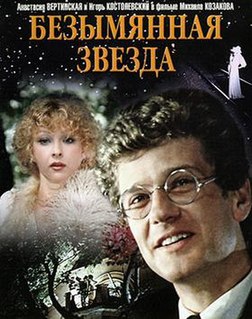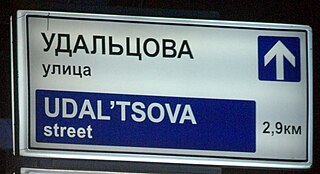
The cinema of the Soviet Union, not to be confused with "cinema of Russia" despite films in the Russian language being predominant in the body of work so described, includes films produced by the constituent republics of the Soviet Union reflecting elements of their pre-Soviet culture, language and history, albeit they were all regulated by the central government in Moscow. Most prolific in their republican films, after the Russian Soviet Federative Socialist Republic, were Armenia, Azerbaijan, Georgia, Ukraine, and, to a lesser degree, Lithuania, Belarus and Moldavia. At the same time, the nation's film industry, which was fully nationalized throughout most of the country's history, was guided by philosophies and laws propounded by the monopoly Soviet Communist Party which introduced a new view on the cinema, socialist realism, which was different from the one before or after the existence of the Soviet Union.

The Five, also known as the Mighty Handful and the New Russian School, were five prominent 19th-century Russian composers who worked together to create a distinct Russian classical music: Mily Balakirev, César Cui, Modest Mussorgsky, Nikolai Rimsky-Korsakov and Alexander Borodin. They lived in Saint Petersburg, and collaborated from 1856 to 1870.

Mikhail Ivanovich Glinka was the first Russian composer to gain wide recognition within his own country, and is often regarded as the fountainhead of Russian classical music. Glinka's compositions were an important influence on future Russian composers, notably the members of The Five, who took Glinka's lead and produced a distinctive Russian style of music.

The Government Inspector, also known as The Inspector General, is a satirical play by the Russian and Ukrainian dramatist and novelist Nikolai Gogol. Originally published in 1836, the play was revised for an 1842 edition. Based upon an anecdote allegedly recounted to Gogol by Pushkin, the play is a comedy of errors, satirizing human greed, stupidity, and the extensive political corruption of Imperial Russia.
Abdul "Duke" Fakir is an American singer. He is a founding member of the Motown act the Four Tops, from 1953 to the present day. A first tenor, Fakir is the group's lone surviving original member, performing today with Ronnie McNeir, Lawrence "Roquel" Payton Jr., and Harold Bonhart.
Saint Petersburg City Administration is the superior executive body of Saint Petersburg, Russian Federation. It is located in a historic building, Smolny and known as the Government of Saint Petersburg.

Big School-Break is a Soviet 1972 TV miniseries in 4 episodes. Its USA screen name is The Long Recess, and it is loosely based on Georgi Sadovnikov's novel "Walk towards people".

David Fyodorovich Tukhmanov PAR is a Soviet and Russian composer. People's Artist of Russia (2000), State Prize of Russian Federation (2003).

Vladimir Ivanovich Ovchinnikov was a Soviet, Russian painter, lived and worked in Leningrad, member of the Leningrad branch of Union of Artists of Russian Federation, regarded by art historian Sergei Ivanov as one of the leading representatives of the Leningrad school of painting, most famous for his landscape paintings.

Arseny Nikiforovich Semionov – Soviet Russian painter and art teacher, lived and worked in Leningrad, a member of the Leningrad Union of Artists, regarded as one of the representatives of the Leningrad school of painting, most famous for his landscape and cityscape paintings.

Dmitry Ivanovich Maevsky was a Soviet Russian painter, lived and worked in Leningrad, a member of the Leningrad Union of Artists, regarded as one of representatives of the Leningrad school of painting, most famous for his lyrical landscapes.
Nikolai Nikolaevich Galakhov is a Russian artist. He is an Honored Artist of the Russian Federation, a member of the Saint Petersburg Union of Artists. Living and working in Saint Petersburg, he is regarded as one of the representatives of the Leningrad School of Painting, and is most famous for his landscape paintings.

Nadezhda Pavlovna Shteinmiller was a Russian Soviet realist painter, graphic artist, art teacher, scenographer, and stage designer who lived and worked in Leningrad. She was a member of the Leningrad Union of Artists, regarded as one of the leading representatives of the Leningrad School of Painting.

Vladimir Gustov is a Russian guitarist, arranger, composer, and sound producer. Currently he is the Maxim Leonidov and Hippoband leader.
Talents and Admirers is a play by Alexander Ostrovsky premiered on December 20, 1881, in Maly Theatre. The author started working upon this 4-act comedy in August 1881 and finished it on December 6 of that year.

The First Inauguration of Vladimir Putin as the President of Russia took place on Sunday, May 7, 2000. The ceremony was held for the first time in the Grand Kremlin Palace and lasted exactly one hour.

Other People's Relatives is a 1956 Soviet drama film directed by Mikhail Schweitzer and based on the story Not to the court by Vladimir Tendryakov.

Nameless Star is a 1979 Soviet romantic comedy television film directed by Mikhail Kozakov and based on the play of the same name by Mihail Sebastian.



















